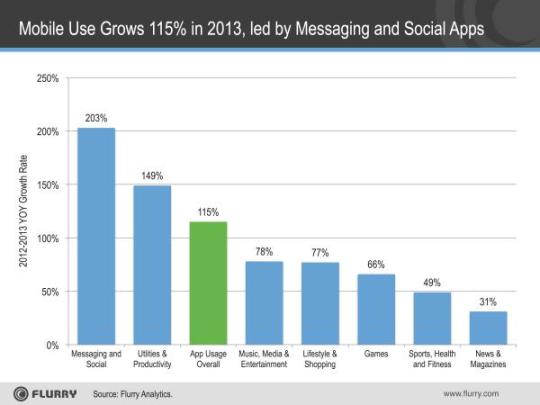In November 2013, Benedict Evans, a well-respected and widely followed analyst, shared an updated version of his famous slide deck called “Mobile is Eating the World”. This deck quickly made the rounds on social media and was highly referenced by industry and financial analysts who cover mobile. We can’t help but agree with Benedict’s conclusion. For the past five years, we have watched mobile disrupt every industry, in every country, and continue to break its own records year after year. 2013 did not disappoint.
According to Flurry Analytics, overall app use in 2013 posted 115% year-over-year growth. (In this context, we define app use as a consumer launching an app and recording what Flurry defines as a session.)
Every single app category has shown growth over the last twelve months. In the chart below, we have focused on the categories of interest to most. Utilities and Productivity apps posted 150% growth in use year-over year, as smartphones and tablets became personal computers and productivity apps, such as Evernote and Quip, gained sophistication and adoption. Even Gaming, which was feared to reach saturation levels in 2013, posted 66% year-over-year growth in use.

However, the segment that showed the most dramatic growth in 2013 was Messaging (Social and Photo sharing included). The growth in that segment should not come as a surprise to many, given the attention that messaging apps such as WhatsApp, WeChat, KakaoTalk, LINE, Facebook Messenger and SnapChat have received in the press. What is surprising, however, is that the rate of growth (tripling usage year-over-year) dramatically outpaced other popular categories. This type of growth could explain the high valuation Facebook has allegedly put on SnapChat, or Facebook’s rush to add direct messaging in Instagram, an app frequented by teens.
While some of these apps, such as Korea-owned and Japan-based LINE, are enjoying great revenue growth, there is still a debate about whether these apps are simply experiences or more of a platform. 2013 saw a few examples of these apps becoming more of the latter.
In March of 2013, and just three months after launching it game distribution platform, LINE announced that it had delivered over 100m downloads to its gaming partners.
Tencent’s WeChat has conducted an experiment with China’s emerging device manufacturer Xiaomi demonstrating WeChat’s potential as an m-commerce player. In that experiment, Xiaomi launched a new smartphone to WeChat users. The result: 150,000 new smartphones sold in under 10 minutes through a messaging application.
Such examples, coupled with Facebook’s own successful entry into the paid mobile app install market, have demonstrated the potential messaging and social applications have to become a mobile storefront for digital and physical goods.
It is these simple yet very promising anecdotes, coupled with an over 200% year-over-year growth, driving the frenzied land grab in the Communications market. 2014 will be a crucial year for these applications and will determine whether they will remain independent, but highly frequented applications, or become killer mobile platforms and distribution channels. TIME magazine has already placed its bets on the latter. At Flurry, we are fascinated by the growth, the retention rate, the reach and the frequency for this category. We see the potential for what it might become, but before declaring that mobile is all about messaging apps, we would like to see more of these marketing/commerce experiments a la Xiaomi/WeChat happen at scale and in many countries.
Another explosive growth year in mobile has passed. On December 31st, 2013 at 11:59 pm, Flurry Analytics tracked a record 4.7 Billion app sessions in a single day, for a total of 1.126 Trillion sessions for the whole year. Those are some very, very big numbers. One minute later the counter went back to zero. A new year has begun, and if the first few days of January are any indication, the mobile world is looking at another major growth year and yes Benedict (and Fred Wilson too), mobile is continuing to eat the world.